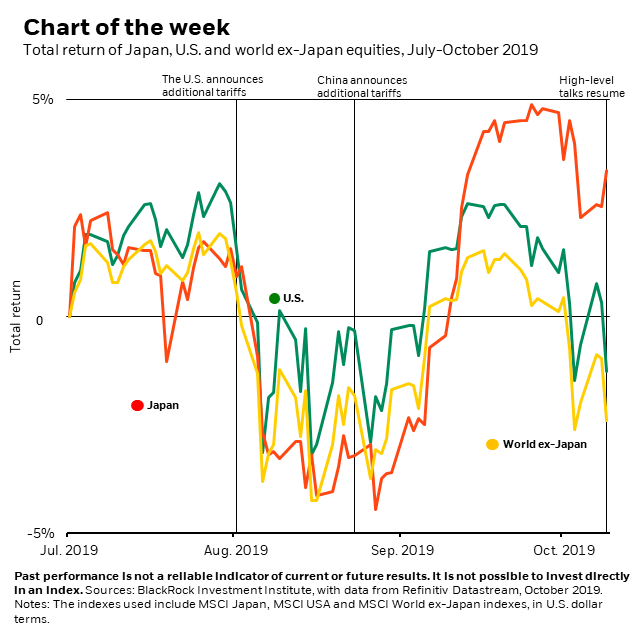Japanese Equities: Still In The Doldrums
Japanese Equities: Still In The Doldrums
Summary
摘要
Japanese equities have been the star performer since September - rising more dramatically than their global peers in a response to a perceived thaw in U.S.-China trade tensions. Yet we maintain our underweight on Japanese equities: They are particularly vulnerable to a growth slowdown in China, and we see no sustained letup in the protectionist push. Yet the recent rally offers a preview of the potential upside in Japanese equities if trade tensions were to fade substantively and growth to reaccelerate.
自9月份以來,日本股市一直是表現最好的股市-漲幅比全球股市更大,這是對美中貿易緊張局勢解凍的迴應。然而,我們仍然減持日本股票:它們特別容易受到中國經濟增長放緩的影響,我們認為保護主義努力不會持續減弱。然而,最近的反彈預示着,如果貿易緊張局勢實質性消退,增長重新加速,日本股市可能會上行。

Japan has been the best performer in major equity markets since midyear. The MSCI Japan index has led both U.S. and global markets (ex-Japan) after a significant climb in September, as the chart shows. The main driver? A perceived easing in U.S.-China trade tensions that led to a shift by investors into unloved assets such as value equities, including beaten-down Japanese stocks. We do not see this rotation having staying power though. In the near term we see potential for further bouts of market volatility, as fallout from the trade war is reflected in weak economic data. See an earlier weekly commentary for details. Yet the recent rebound in Japanese equities offers a preview of the potential market reaction should the global economy reaccelerate in 2020. Japanese equities' cheapness could exaggerate any such move. The price-to-earnings ratio of the blue-chip Nikkei 225 Index has fallen to a historical low of 12.
自年中以來,日本一直是主要股市中表現最好的國家。摩根士丹利資本國際日本指數(MSCI Japan Index)在9月份大幅攀升後,一直領跑美國和全球市場(不包括日本),如圖所示。主要司機是誰?美中貿易緊張局勢明顯緩解,導致投資者轉向價值股票等不受歡迎的資產,包括遭受重創的日本股票。不過,我們看不到這種輪換有持久力。短期內,我們認為市場可能會進一步波動,因為貿易戰的影響反映在疲弱的經濟數據中。看見早些時候的每週評論瞭解更多細節。然而,日本股市最近的反彈為人們提供了一個預覽,即如果全球經濟在2020年重新加速,市場可能會做出什麼反應。日本股市的便宜可能會誇大任何此類走勢。藍籌股日經225指數的市盈率已降至歷史低點12倍。
Trade disputes and geopolitical frictions have become key drivers of the global economy and markets, as we outlined in the recent update to our Global investment outlook. Trade dynamics play an outsized role in Japanese equities: As much as half of the revenues of Nikkei 225 companies come from international sales, even though exports' contribution to Japan's GDP is at a much lower 15%. China is the largest market for Japan's exported goods, and orders from China for machines and electronics parts have collapsed since November 2018. We see a lull in China's growth due to the fallout of U.S. tariffs. China's policy stance is likely to ease further to help stabilize growth, yet an incremental boost to growth seems unlikely, in our view. Japan's leverage to global trade leaves it vulnerable to any further downdrafts tied to the protectionist push.
貿易爭端和地緣政治摩擦已成為全球經濟和市場的關鍵驅動因素,正如我們在最近更新的全球投資展望。貿易動態在日本股市中扮演着非常重要的角色:日經225指數成份股公司高達一半的收入來自國際銷售,儘管出口對日本GDP的貢獻率要低得多,只有15%。中國是日本出口商品的最大市場,自2018年11月以來,來自中國的機械和電子零部件訂單暴跌。我們看到,由於美國關税的影響,中國的增長出現了停滯。中國的政策立場可能會進一步放鬆,以幫助穩定增長,但在我們看來,增量提振增長的可能性似乎不大。日本對全球貿易的影響力使其容易受到與保護主義努力相關的任何進一步下行的影響。
Japan also is faced with a number of domestic challenges. A recent sales tax increase could weigh on consumer spending and growth. The Bank of Japan (BoJ) may be running out of policy space. After years of ultra-loose monetary policy, the central bank's asset holdings have exceeded the country's total GDP - making the BoJ the biggest asset owner among key developed market central banks. We see room for only a modest rate cut by the BoJ at its policy meeting in late October. A potential wildcard: BoJ Governor Haruhiko Kuroda has spoken of the potential for greater coordination between monetary and fiscal policy, echoing the theme of our recent piece Dealing with the next downturn. Any growth slowdown induced by the hike in Japan's sales tax could be met with a fiscal stimulus in early 2020.
日本也面臨着一些國內挑戰。最近的銷售税上調可能會拖累消費者支出和增長。日本央行(BoJ)的政策空間可能即將耗盡。在實施了多年的超寬鬆貨幣政策後,日本央行的資產持有量已超過日本國內生產總值(GDP)的總和--使日本央行成為主要發達市場央行中最大的資產所有者。我們認為,日本央行在10月下旬的政策會議上只有適度降息的空間。一個潛在的通配符:日本央行行長黑田東彥(Haruhiko Kuroda)談到了貨幣政策和財政政策之間加強協調的潛力,呼應了我們最近這篇文章的主題應對下一次經濟低迷。日本銷售税上調導致的任何增長放緩,都可能在2020年初用財政刺激措施來應對。
Bottom Line
底線
We remain underweight Japanese equities for now. We still expect weakness in global growth data over the next few months, as easier monetary conditions slowly filter through to benefit the broader economy in the next six to 12 months. But if a prolonged trade truce between the U.S. and China were to take place and global manufacturing activities bottomed out, we would need to reassess our view on Japanese equities. Their close correlation with the health of global manufacturing activities and China's growth, as well as their beaten-down valuations, could make them attractive. Another positive in the background: Japanese firms are gradually improving their corporate governance, reflected in increased payouts to investors in the form of dividends and share buybacks.
目前,我們仍在減持日本股票。我們仍預計未來幾個月全球增長數據將疲軟,因為寬鬆的貨幣環境將在未來6至12個月內緩慢滲透,惠及更廣泛的經濟。但是,如果美國和中國之間的長期貿易休戰發生,全球製造業活動觸底,我們將需要重新評估我們對日本股市的看法。它們與全球製造業活動的健康狀況和中國的增長密切相關,以及它們遭受重創的估值,可能會使它們變得有吸引力。背景中的另一個積極因素是:日本公司正在逐步改善其公司治理,這反映在以股息和股票回購的形式向投資者支付的更多股息。
This post originally appeared on the BlackRock Blog.
這開機自檢最初出現在貝萊德的博客上。
Editor's Note: The summary bullets for this article were chosen by Seeking Alpha editors.
編者注:本文的摘要項目符號是由尋找Alpha編輯選擇的。

 Japanese equities have been the star performer since September - rising more dramatically than their global peers in a response to a perceived thaw in U.S.-China trade tensions. Yet we maintain our underweight on Japanese equities: They are particularly vulnerable to a growth slowdown in China, and we see no sustained letup in the protectionist push. Yet the recent rally offers a preview of the potential upside in Japanese equities if trade tensions were to fade substantively and growth to reaccelerate.
Japanese equities have been the star performer since September - rising more dramatically than their global peers in a response to a perceived thaw in U.S.-China trade tensions. Yet we maintain our underweight on Japanese equities: They are particularly vulnerable to a growth slowdown in China, and we see no sustained letup in the protectionist push. Yet the recent rally offers a preview of the potential upside in Japanese equities if trade tensions were to fade substantively and growth to reaccelerate.